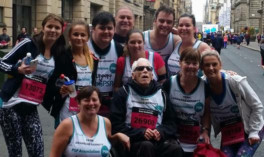The wife of a man with a little-known neurodegenerative disease has spoken of her pride after three generations of her family donned their trainers and competed in a race to raise funds to help combat the illness.
Margaret Bennett, 70, took part in the Great Scottish Run 10k event in Glasgow recently along with her wheelchair confined husband Albert, 73, who suffers from Progressive Supranuclear Palsy (PSP).
The tenacious duo were joined on their run by their daughter, four grandchildren and their partners as well as their son and daughter-in-law.
Several family members took part in the half marathon while Margaret, her son-in-law and Albert completed the 10k.
An elated Mrs Bennett revealed she was inspired to get the whole family involved in the race after witnessing the transformation of her husband from a powerful man who regularly competed in marathons to someone who is unable to eat and move without help.
She said: “PSP affects everything. It affects mobility. Sufferers are left stiff and lose their voice.
“Eating becomes a problem and people can lose their eyesight. Albert is in a chair most of the time and his food has to be blended.
“There is no medication for PSP. People with conditions like Parkinson’s can take a pill to help, but for this there is nothing except painkillers.
“It’s so frustrating because PSP is a progressive brain disease, but people just aren’t aware of its existence.
“Even during the race people weren’t sure what our PSP Association T-shirts meant.
“My husband’s mind is OK but he can’t speak and it is hard for him to do things by himself.
“He used to compete in marathons and only ever missed one marathon in Dundee.
“This is why we all decided to take part in the race to raise awareness and funds.
“It was a great family day out and my son-in-law pushed Albert the whole way round and helped him up to complete the last few steps to the finishing line on his own.”
PSP is a chronic Parkinson’s-like neurological condition caused by the premature loss of nerve cells in certain parts of the brain.
Over time this leads to difficulties with balance, movement, vision, speech and swallowing.
There is currently no known cure for the disease, with 5,000 people affected throughout the UK.
For more about PSP and the help available visit www.pspassociation.org.uk.
